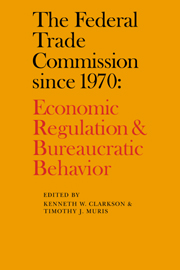Book contents
- Frontmatter
- Contents
- List of contributors
- Preface
- 1 Introduction
- Part I The institutional setting
- Introduction
- 2 Statutory powers
- 3 Legislative constraints
- 4 Judicial constraints
- 5 Executive constraints
- Part II Nature and consequence of FTC actions
- Part III Conclusions and reforms
- Notes
- Selected bibliography
- Index
4 - Judicial constraints
Published online by Cambridge University Press: 05 November 2011
- Frontmatter
- Contents
- List of contributors
- Preface
- 1 Introduction
- Part I The institutional setting
- Introduction
- 2 Statutory powers
- 3 Legislative constraints
- 4 Judicial constraints
- 5 Executive constraints
- Part II Nature and consequence of FTC actions
- Part III Conclusions and reforms
- Notes
- Selected bibliography
- Index
Summary
This chapter considers the limits that courts place on the Commission's substantive powers. Our principal concern is whether the Commission or the courts determine the standard for legality when the agency challenges a business practice. Or, put in a form perhaps more comfortable to lawyers: Assuming no dispute over facts, will the courts routinely allow the FTC to decide whether those facts constitute illegality? For example, when the Commission finds an advertisement to be unfair or deceptive within Section 5 of the FTC Act, to what extent will the reviewing courts allow the agency to define what is lawful?
We focus primarily on Section 5 of the FTC Act, which allows the Commission to prohibit “unfair methods of competition” and “unfair or deceptive acts and practices.” The cases we discuss are from the Courts of Appeals and the Supreme Court, the only two levels of the federal court system that regularly review FTC substantive decisions. Because Commission substantive orders are appealable directly to the circuit courts, the district courts render few substantive decisions. From the circuit courts, the cases can be appealed to the Supreme Court. Finally, because decisions prior to 1970 not only have influenced, but to a major extent have determined, the current attitude of the courts toward the Commission, we will necessarily consider many cases decided before 1970.
We begin with early decisions indicating that the courts would constrain the Commission's prerogative to act in the way it chose (i.e., by limiting the agency's ability to define illegality).
- Type
- Chapter
- Information
- The Federal Trade Commission since 1970Economic Regulation and Bureaucratic Behavior, pp. 35 - 49Publisher: Cambridge University PressPrint publication year: 1981



